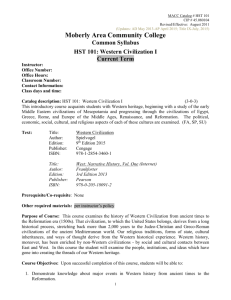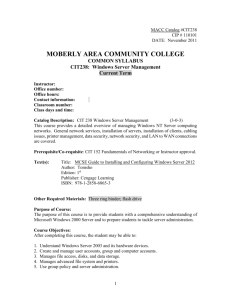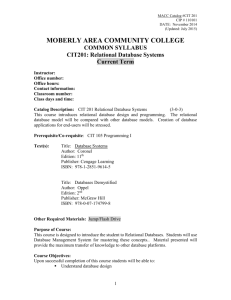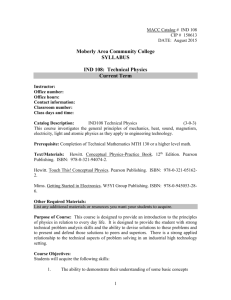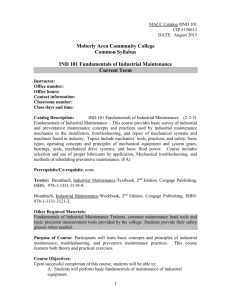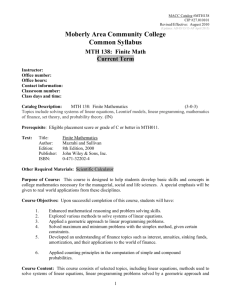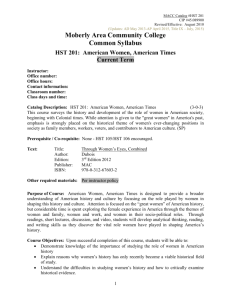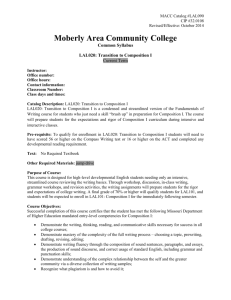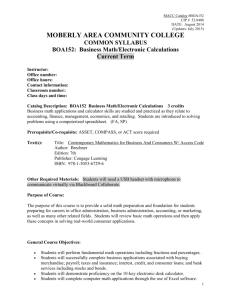HST 102 Western Civilization II - Moberly Area Community College
advertisement
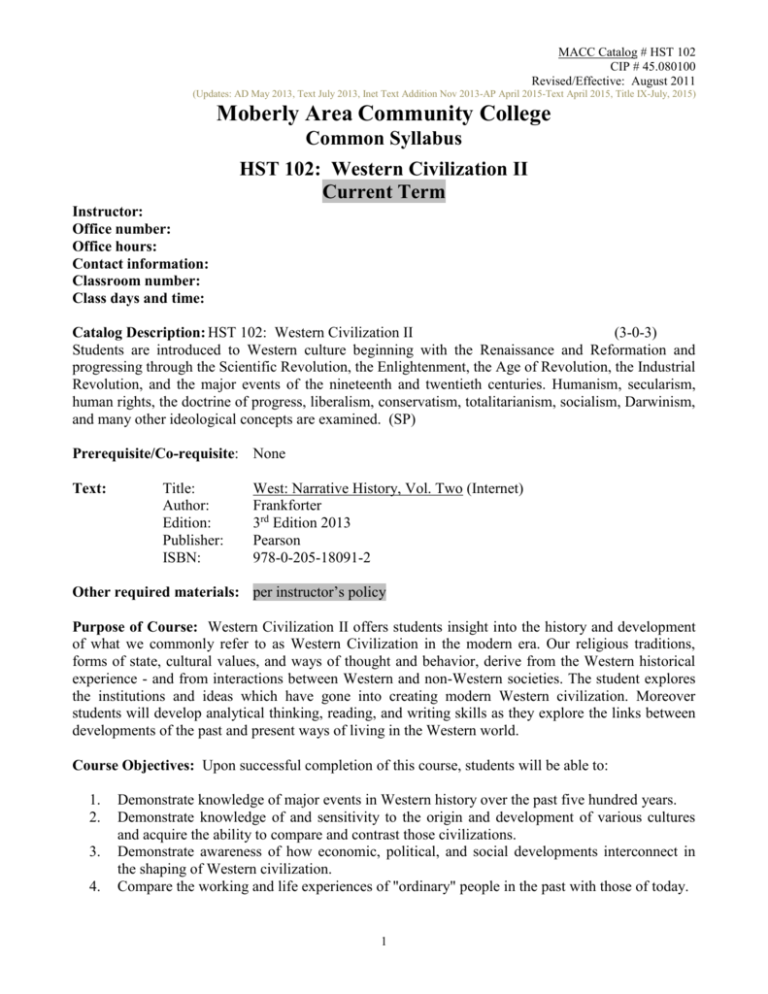
MACC Catalog # HST 102 CIP # 45.080100 Revised/Effective: August 2011 (Updates: AD May 2013, Text July 2013, Inet Text Addition Nov 2013-AP April 2015-Text April 2015, Title IX-July, 2015) Moberly Area Community College Common Syllabus HST 102: Western Civilization II Current Term Instructor: Office number: Office hours: Contact information: Classroom number: Class days and time: Catalog Description: HST 102: Western Civilization II (3-0-3) Students are introduced to Western culture beginning with the Renaissance and Reformation and progressing through the Scientific Revolution, the Enlightenment, the Age of Revolution, the Industrial Revolution, and the major events of the nineteenth and twentieth centuries. Humanism, secularism, human rights, the doctrine of progress, liberalism, conservatism, totalitarianism, socialism, Darwinism, and many other ideological concepts are examined. (SP) Prerequisite/Co-requisite: None Text: Title: Author: Edition: Publisher: ISBN: West: Narrative History, Vol. Two (Internet) Frankforter 3rd Edition 2013 Pearson 978-0-205-18091-2 Other required materials: per instructor’s policy Purpose of Course: Western Civilization II offers students insight into the history and development of what we commonly refer to as Western Civilization in the modern era. Our religious traditions, forms of state, cultural values, and ways of thought and behavior, derive from the Western historical experience - and from interactions between Western and non-Western societies. The student explores the institutions and ideas which have gone into creating modern Western civilization. Moreover students will develop analytical thinking, reading, and writing skills as they explore the links between developments of the past and present ways of living in the Western world. Course Objectives: Upon successful completion of this course, students will be able to: 1. 2. 3. 4. Demonstrate knowledge of major events in Western history over the past five hundred years. Demonstrate knowledge of and sensitivity to the origin and development of various cultures and acquire the ability to compare and contrast those civilizations. Demonstrate awareness of how economic, political, and social developments interconnect in the shaping of Western civilization. Compare the working and life experiences of "ordinary" people in the past with those of today. 1 MACC Catalog # HST 102 CIP # 45.080100 Revised/Effective: August 2011 (Updates: AD May 2013, Text July 2013, Inet Text Addition Nov 2013-AP April 2015-Text April 2015, Title IX-July, 2015) Course Content: Major topics: Background to Early Modern Europe; Reformation Europe the expansion of Europe; the rise of Absolutism ; the Scientific Revolution and the Enlightenment; the Age of Revolution and Napoleon; Industrial Revolution and its social effects; Nationalism, Conservatism, Liberalism in the nineteenth World War I; interwar years and World War II; revival of Europe and the Cold War; decline of Communism. Assessment of Student Learning: (Instructors will state the course requirements and grading system. Student learning outcomes may be measured through, but not limited to, the following: objective and essay questions, papers, quizzes, oral presentations, small group work, and/or projects. Instructors are free to use their own grading procedures, consistent with the general policies and guidelines of the College.) Description of Major Assignment(s)/Project(s): per instructor’s policy Statement to Connect Course with General Education Outcomes or Technical Program Outcome Statement: In compliance with MACC’s General Education outcomes, the student who successfully completes this course will be able to: Demonstrate effective written and oral communication skills; Will assess and appreciate artifacts in language, art, music, or philosophy and be able to evaluate those artifacts as representations of form, cultural context, and individual expression; Demonstrate knowledge of how history has shaped society and culture, understand how the individual relates to society and culture, appreciate cultural diversity, understand human behavior and mental processes, and understand human development. Instructor Policies: Academic Dishonesty: MACC board policy is as follows: “Academic dishonesty by students damages institutional credibility and unfairly jeopardizes honest students; therefore, it will not be tolerated in any form.” Forms of academic dishonesty include but are not limited to the following: violations of copyright law, plagiarism, fabrication, cheating, collusion, and other academic misconduct. Incidents of dishonesty regarding assignments, examinations, classroom/laboratory activities, and/or the submission of misleading or false information to the College will be treated seriously. The procedure for handling academic dishonesty is outlined in the Student Handbook (Policy Handbook M.010). In cases of alleged academic dishonesty, the burden of proof is on the student, not on the instructor. Attendance Policy: Any student who misses two consecutive weeks of class during a regular sixteenweek semester or the equivalent proportion of class time during a shorter session will be dropped from the class by the instructor unless acceptable justification is supplied. An instructor must complete and file the appropriate forms to drop the student within one week following the student’s violation of the attendance policy. Additionally, any student who misses more than one-fourth of the entire number of in-seat class meetings in a regular 16-week semester or the equivalent proportion of class time during a shorter session, may be dropped from that class by the instructor if, in the opinion of the instructor, the student does not have reasonable opportunity to succeed in the class. A student’s attendance rate will be calculated based upon the first day of the semester (not the student’s date of enrollment in the course.) 2 MACC Catalog # HST 102 CIP # 45.080100 Revised/Effective: August 2011 (Updates: AD May 2013, Text July 2013, Inet Text Addition Nov 2013-AP April 2015-Text April 2015, Title IX-July, 2015) Student attendance must be defined in a different manner for online, hybrid, and virtual courses. Student attendance in these courses is defined as active participation in the course. Online, hybrid, and virtual courses will, at a minimum, have weekly mechanisms for student participation, such as any or all of the following methods: a. Completion of quizzes or exams b. Submission of assignments c. Participation in threaded discussions d. Communication with the instructor A student who does not participate in an online, hybrid, or virtual course for two consecutive weeks will be dropped by the instructor unless acceptable justification is supplied. An instructor must complete and file the appropriate forms to drop the student within one week following the student’s violation of the attendance policy. As with ground courses, a student’s attendance rate in online courses will also be calculated based upon the first day of the semester. If a student does not demonstrate active participation in the online course within the first two weeks (or the equivalent proportion of class time during a short session), the student will be dropped as “never attended.” Simply logging into an online class does not constitute active participation. Students should be aware that their dropping a course and their last date of attendance in the course may impact their financial aid. (Policy Handbook I.090 and M.095) Tardiness: per instructor’s policy Make-up and late work: per instructor’s policy Extra-credit work: per instructor’s policy Schedule of Student Assignments/Activities: Instructors will identify a Student Assignment/Activities schedule. Instructors have the prerogative to construct the schedule by class periods, weeks, or an overview of topics to be covered. ADA Statement Students who have disabilities that qualify under the Americans with Disabilities Act may register for assistance through the Office of Access and ADA Services. Students are invited to contact the Access Office to confidentially discuss disability information, academic accommodations, appropriate documentation and procedures. For more information, please call either the Moberly office at (660) 263-4100 x 11240 or the Columbia office at (573) 234-1067 x 12120, or visit our web page at http://www.macc.edu/index.php/services/access-office. 3 MACC Catalog # HST 102 CIP # 45.080100 Revised/Effective: August 2011 (Updates: AD May 2013, Text July 2013, Inet Text Addition Nov 2013-AP April 2015-Text April 2015, Title IX-July, 2015) Title IX Statement MACC maintains a strict policy prohibiting sexual misconduct in any form, including sexual harassment, sexual discrimination, and sexual violence. All MACC employees, including faculty members, are considered mandated reporters of sexual misconduct and as such are expected to contact the Title IX Coordinator when they become aware, in conversation or in writing, of an incident of sexual misconduct. For more information on this policy or to learn about support resources, please see http://www.macc.edu/sexual-misconduct-policy or contact Dr. Jackie Fischer, MACC’s Title IX Coordinator, at 660-263-4110, ext. 11236 or jackief@macc.edu. 4



